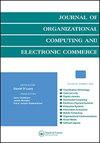Confront, Accept or Reinterpret? Coping Mediation Effects on Attribution in Cloud Service Failure
IF 1.9
4区 管理学
Q3 COMPUTER SCIENCE, INFORMATION SYSTEMS
Journal of Organizational Computing and Electronic Commerce
Pub Date : 2020-08-10
DOI:10.1080/10919392.2020.1790984
引用次数: 3
Abstract
ABSTRACT Online service failure can be disruptive to end users, leading some to confront the service provider to vent their anger and anxiety. Prior research holds that users’ attributions regarding the cause of the service failure affect their perceptions of the service provider. These attributions can be mediated by the user’s coping style. However, few studies have examined the role of coping in dealing with online service failure. This study tests the mediating effects of three coping styles (e.g. confrontational, acceptance and positive reinterpretation) on attribution in online service failure in a cloud storage context. The study finds that control attribution predicted confrontational coping but not acceptance or positive reinterpretation. The more the user believes the failure cause is permanent (stability attribution), the more likely they are to use acceptance coping, but the less likely they are to use confrontational coping or positive reinterpretation. In addition, confrontational coping partially mediated the relation between control attribution and satisfaction, and positive interpretation partially mediated the relation between stability attribution and satisfaction. Acceptance did not predict satisfaction.面对,接受还是重新诠释?应对中介对云服务故障归因的影响
摘要在线服务失败可能会对最终用户造成破坏,导致一些人与服务提供商对峙,以发泄他们的愤怒和焦虑。先前的研究认为,用户对服务失败原因的归因会影响他们对服务提供商的看法。这些归因可以通过用户的应对方式来调节。然而,很少有研究考察应对在应对在线服务失败中的作用。本研究测试了三种应对方式(如对抗、接受和积极重新解释)对云存储环境下在线服务失败归因的中介作用。研究发现,控制归因预测对抗性应对,而不是接受或积极的重新解释。用户越是认为失败原因是永久性的(稳定性归因),他们就越有可能使用接受应对,但他们就越不可能使用对抗性应对或积极的重新解释。此外,对抗性应对部分中介了控制归因与满意度之间的关系,积极解释部分中介了稳定性归因与满意度的关系。接受并不能预测满意度。
本文章由计算机程序翻译,如有差异,请以英文原文为准。
求助全文
约1分钟内获得全文
求助全文
来源期刊

Journal of Organizational Computing and Electronic Commerce
工程技术-计算机:跨学科应用
CiteScore
5.80
自引率
17.20%
发文量
7
审稿时长
>12 weeks
期刊介绍:
The aim of the Journal of Organizational Computing and Electronic Commerce (JOCEC) is to publish quality, fresh, and innovative work that will make a difference for future research and practice rather than focusing on well-established research areas.
JOCEC publishes original research that explores the relationships between computer/communication technology and the design, operations, and performance of organizations. This includes implications of the technologies for organizational structure and dynamics, technological advances to keep pace with changes of organizations and their environments, emerging technological possibilities for improving organizational performance, and the many facets of electronic business.
Theoretical, experimental, survey, and design science research are all welcome and might look at:
• E-commerce
• Collaborative commerce
• Interorganizational systems
• Enterprise systems
• Supply chain technologies
• Computer-supported cooperative work
• Computer-aided coordination
• Economics of organizational computing
• Technologies for organizational learning
• Behavioral aspects of organizational computing.
 求助内容:
求助内容: 应助结果提醒方式:
应助结果提醒方式:


